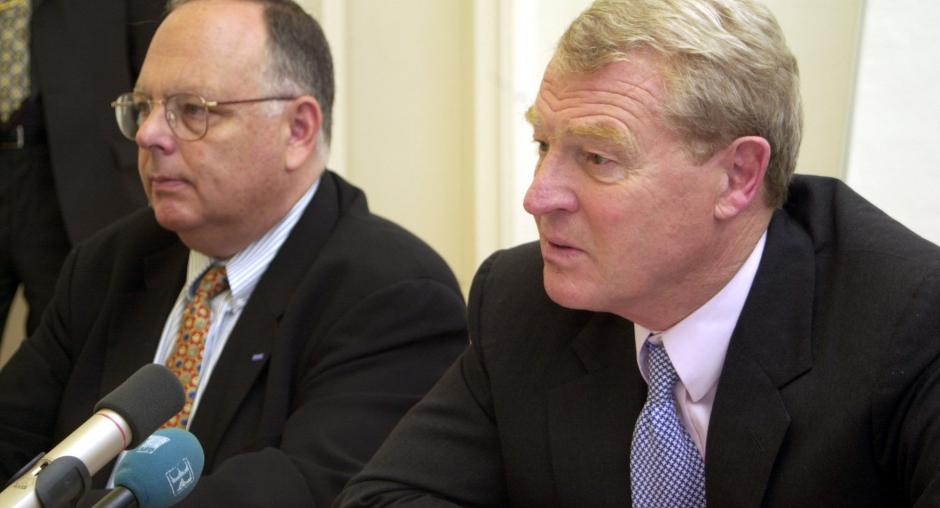Newsroom
OSCE's role in Bosnia and Herzegovina remains crucial, says High Representative Lord Ashdown
VIENNA 15 December 2005

Lord Ashdown (right) speaking to the press in a 4 July 2002 file photo. (Ayhan Evrensel/OSCE) Photo details
VIENNA, 15 December 2005 - The OSCE will continue to play a crucial part in Bosnia and Herzegovina, the outgoing High Representative and European Union Special Representative for Bosnia and Herzegovina (BiH), Lord Paddy Ashdown, told the OSCE Permanent Council today.
"As the Office of the High Representative progressively withdraws from the field to concentrate on monitoring at higher Government levels, the OSCE Mission to Bosnia and Herzegovina will have much to do," he told the representatives of the 55 OSCE participating States. "It will increasingly provide the eyes and ears on the ground for the rest of a slimmed-down international community."
Lord Ashdown, who took up his post in May 2002 and is due to leave early 2006, added that "the OSCE's agenda contains some of the most important keys to ensuring that Bosnia and Herzegovina reaches its full potential."
As main priorities for next year, he named functional and public administrative reform, the strengthening of civil society and voter education, and the mobilisation of the country's young people.
"The education system must be a bulwark against ethnic, religious, cultural and any other kind of prejudice or segregation," the High Representative said, and warned that despite all the OSCE's efforts, progress in education reform had been too slow.
"Fortunately, the issues on the OSCE's agenda are mutually reinforcing. The reform of education, the affirmation of the rule of law, the protection of human rights, and the maturation of civil society can and should constitute a virtuous circle," he added.
Lord Ashdown also urged the OSCE Mission to be "in the thick of the discussion" in 2006 on the Stabilization and Association Agreement (SAA) between the EU and Bosnia and Herzegovina.
"The opening of an SAA marks a new phase in which the international community needs to hand over the lead responsibility for reform to the Bosnia and Herzegovina authorities. We need to get the formula right," he said.
The High Representative strongly underlined the special role of the EU in south-eastern Europe. "It is crucial that no one is in any doubt that Europe is the only glue that binds the Balkans to a single, peaceful future," he said.
While citing many positive achievements in BiH over the past years - including the return of one million refugees and the ongoing reunification of army and police forces - Lord Ashdown also stressed that it was time for the international community to change its approach to the country.
"The phase of intensive and intrusive state building in Bosnia and Herzegovina must now come to an end," he said. "Bosnia and Herzegovina is on the highway to Europe. It is time to leave the days of coercion and imposition behind."
"As the Office of the High Representative progressively withdraws from the field to concentrate on monitoring at higher Government levels, the OSCE Mission to Bosnia and Herzegovina will have much to do," he told the representatives of the 55 OSCE participating States. "It will increasingly provide the eyes and ears on the ground for the rest of a slimmed-down international community."
Lord Ashdown, who took up his post in May 2002 and is due to leave early 2006, added that "the OSCE's agenda contains some of the most important keys to ensuring that Bosnia and Herzegovina reaches its full potential."
As main priorities for next year, he named functional and public administrative reform, the strengthening of civil society and voter education, and the mobilisation of the country's young people.
"The education system must be a bulwark against ethnic, religious, cultural and any other kind of prejudice or segregation," the High Representative said, and warned that despite all the OSCE's efforts, progress in education reform had been too slow.
"Fortunately, the issues on the OSCE's agenda are mutually reinforcing. The reform of education, the affirmation of the rule of law, the protection of human rights, and the maturation of civil society can and should constitute a virtuous circle," he added.
Lord Ashdown also urged the OSCE Mission to be "in the thick of the discussion" in 2006 on the Stabilization and Association Agreement (SAA) between the EU and Bosnia and Herzegovina.
"The opening of an SAA marks a new phase in which the international community needs to hand over the lead responsibility for reform to the Bosnia and Herzegovina authorities. We need to get the formula right," he said.
The High Representative strongly underlined the special role of the EU in south-eastern Europe. "It is crucial that no one is in any doubt that Europe is the only glue that binds the Balkans to a single, peaceful future," he said.
While citing many positive achievements in BiH over the past years - including the return of one million refugees and the ongoing reunification of army and police forces - Lord Ashdown also stressed that it was time for the international community to change its approach to the country.
"The phase of intensive and intrusive state building in Bosnia and Herzegovina must now come to an end," he said. "Bosnia and Herzegovina is on the highway to Europe. It is time to leave the days of coercion and imposition behind."
